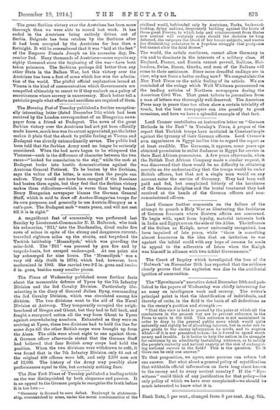The "Eyewitness's" narrative dated December 10th and pub- lished in
the papers of Wednesday was chiefly interesting for
an essay on intelligence work and secrecy. The writer's principal point is that the identification of individuals, and
thereby of units, in the field is the basis of all deductions as
to the enemy's position and strength :—
" That this view is held is proved by the pains at which all the combatants in the present war are to prevent reference in the Press to units in the field. This reticence is not maintained in order to deny to the general public news which would quite naturally and rightly be of absorbing interest, but in order not to give gratis to the enemy information ho needs, and to acquire which—if it is not presented to him—he is forced to spend much money and trouble. Is it better to help the nation in its struggle for existence by an admittedly tantalizing reticence, or to satisfy the people's curiosity and natural anxiety at the risk of endanger- ing national success in the field ? This is the question. To it there can be only one answer."
To that proposition, we agree, sane persons can return but one answer. But what about a general policy of mystification that withholds official information on facts long since known to the enemy and to every neutral country P If the " Eye- witness" could think of any justification for that policy—the only policy of which we have ever complained—we should be much interested to know what it is.






































 Previous page
Previous page